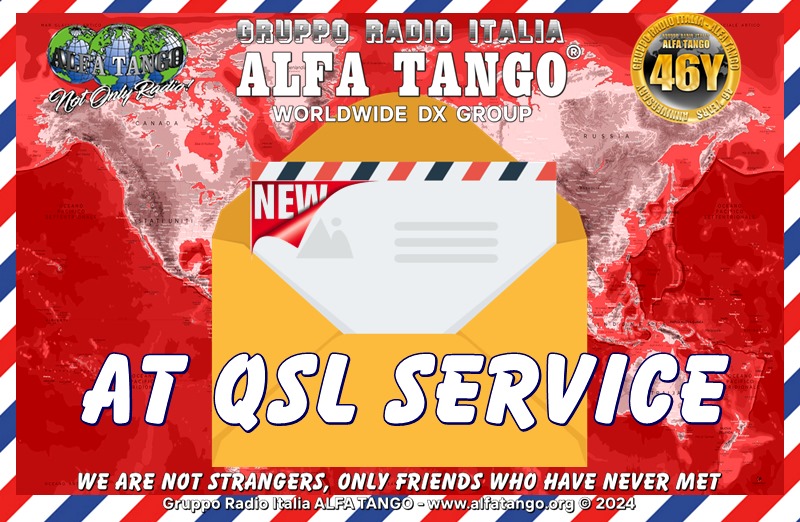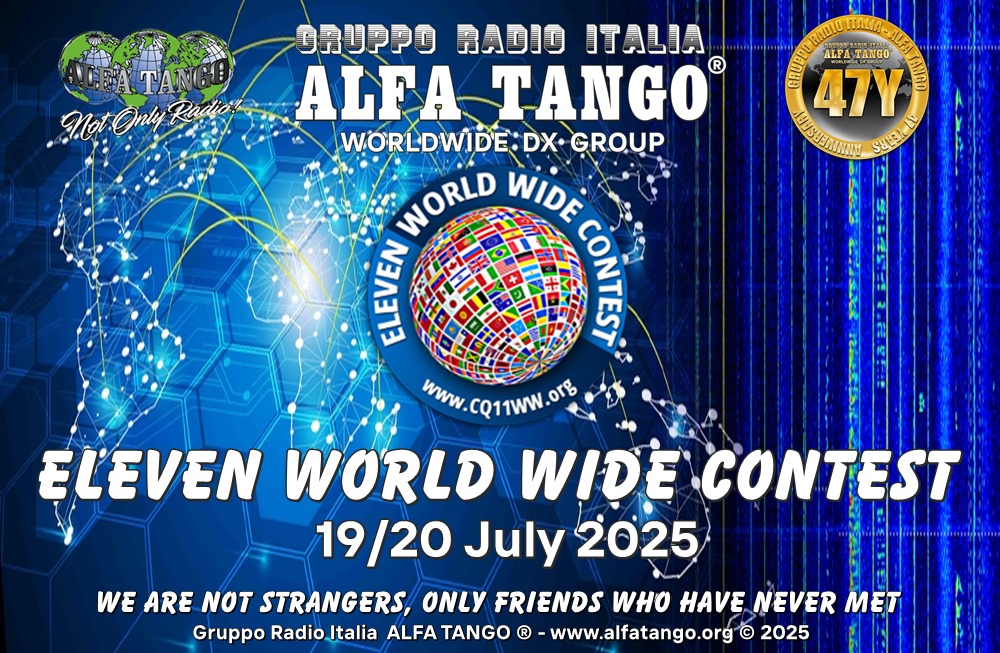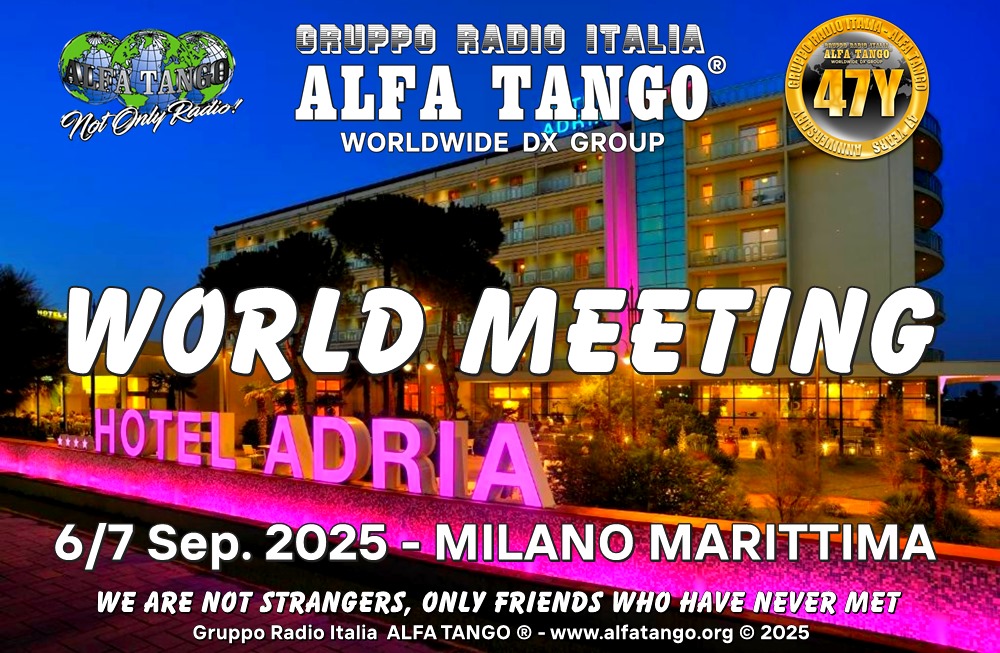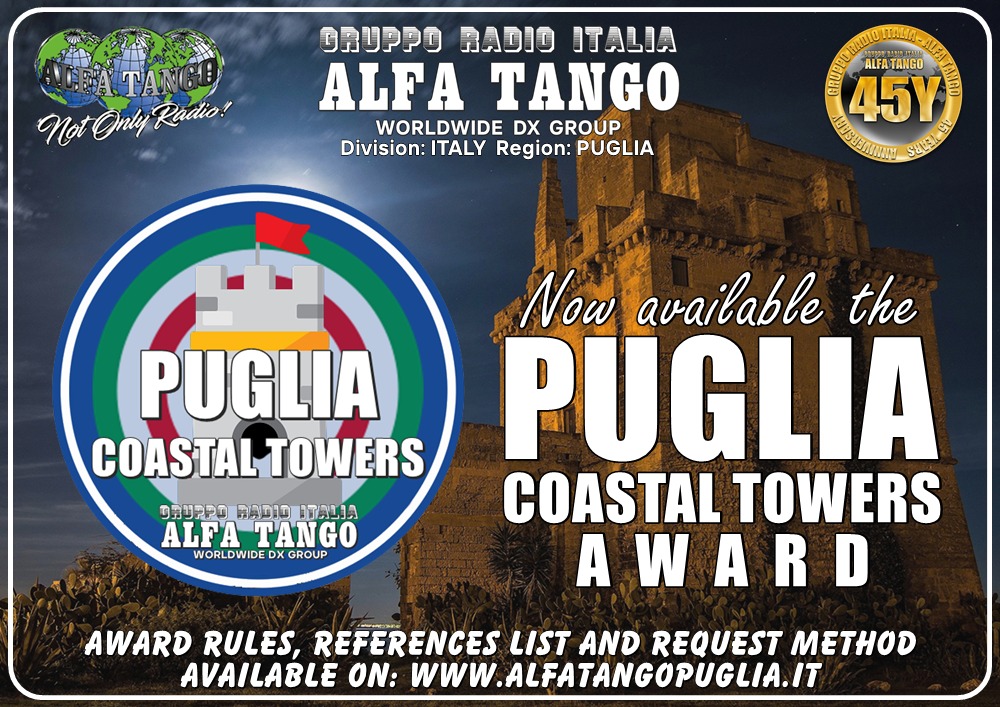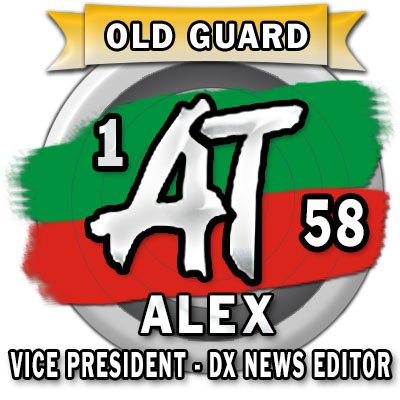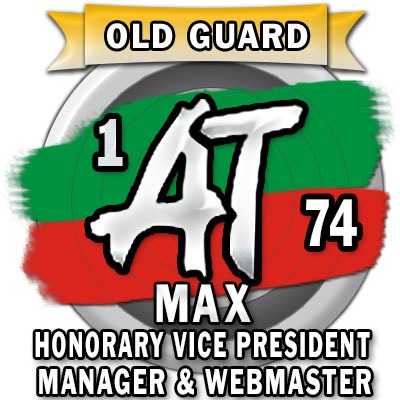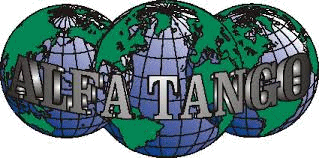
Article Index
Page 1 of 7
Revision: 13/12/2024
This regulation may be modified at any time, depending on emerging needs, by the Board of Directors of the G.R.I. ALFA TANGO. In case of violation of the same, the Coordinators and Directors (defined in art. 2) are required to report the episode to the Headquarters, with a detailed report.
1. AT callsign
For the AT Group the 11 mt are a band, and as with the OMs in the bands dedicated to them, only your own AT callsign must be used on ours. This does not prevent you from also being registered with other groups or associations, but for every local activity, Dx, Contest, S.E.S., etc. you must only use your own AT callsign. Violators will be subject to disciplinary action:
- First violation: warning and monitoring
- Second violation: expulsion
In the event of a violation, the Coordinators and Directors are invited to send a detailed report on the facts to the headquarters.
2. Coordinators and Directors
The Divisional (foreign) and Regional (Italy) Coordinators take care of the organization and coordination of the regions/provinces, and collaborate with the Headquarters for all the Group's activities.
They also deal with the selection of new units in the territory, and are the first filter for their recruitment. They will be able to promote activities at a local level (activations, meetings, etc.) which must in any case be communicated and approved by the Head Office or by their designated bodies.
All coordinators, directors and those who choose to be involved in an official position in the Radio Italia ALFA TANGO Group should do that exclusively and not be involved or active in other groups and associations.
The Regional Coordinator is appointed by the Group's Board of Directors. Any nomination proposed by the Directors or individual units will be taken into consideration.
The Regional Coordinator thus appointed will remain in office for 4 years. In the event of resignation, the successor (appointed by the Board of Directors) will remain in office until the natural expiry of the resigning party's mandate.
The requirements to be appointed Regional Coordinator are:
-
minimum 5 consecutive years of membership in the AT Group;
-
have demonstrated dedication to the Group and/or carried out important activities for it;
-
availability of time to dedicate to the management of one's region, to the supervision of the districts and to activities for the benefit of the Group.
The Provincial Directors exist in the districts where at least 5 units operate, and are appointed by the Regional Coordinator in agreement with the Headquarters.
The requirements to be appointed Provincial Director are:
-
minimum 5 consecutive years of membership in the AT Group;
-
have demonstrated dedication to the Group and/or carried out important activities for it;
-
availability of time to dedicate to the management of the district and activities for the benefit of the Group.
In the provinces that do not reach the 5 envisaged units, a "delegation contact person" may sometimes be recognized, who collaborates with the Regional Coordinator and/or with the Headquarters.
Both the Coordinators and the Directors may be removed, at any time, from the role assigned at the sole discretion of the Board of Directors of the Group if behaviors are highlighted that are not in line with the Group's regulations and do not comply with the spirit of friendship and cordiality that is owed to be among all the members of the Alfa Tango Group.
For the foreign Divisions, the Board of Directors will evaluate on a case-by-case basis the possibility of designating a Divisional Coordinator, identifying him among the units possessing the requirements deemed essential.
The Board of Directors, in particular circumstances and if it deems it necessary, may appoint Directors and Coordinators in derogation of the requirements established in this regulation.
3. 100% AT
All units cannot hold positions or carry out activities in favor or on behalf of other similar groups or associations.
4. AT worldwide
The AT Group is not a federation of Clubs or Divisions. When you join the AT, you are part of the Group as a whole and not as a member of a particular state, region or province, or of Division 1, 2, 13, etc. Everyone joins the G.R.I. ALFA TANGO “worldwide” and everyone shares the same rights and duties.
5. QSL Managers & MAIL Managers
The QSL managers are ONLY those authorized by AT Worldwide Headquarters, others cannot be requested by AT members.
This service is entrusted to 1AT351 Marco and his Team (Marco's Team).
The Team is made up of AT members who can demonstrate that they have free time and financial conditions to carry out this task, and have no less than 5 years of membership in the Group.
Other collaborators, in the future and based on propagation conditions, may be added to this Team under the supervision of 1AT351 Marco.
The QSL Manager is a figure who, in possession of the log of a station, receives and satisfies QSL card requests on its behalf. If for any reason (lack of log or QSL) the QSL Manager is unable to carry out his task, after a period of no less than 90 days he is required to send a QSL card without information and attach an explanatory note.
The Mail Manager is a figure who receives correspondence on behalf of a specific station, and periodically forwards it to the same. It does not respond to QSL requests but only acts as an intermediary for postal traffic. As such it cannot ask for contributions of any kind.
No AT can be QSL Manager or Mail Manager of NON-AT stations. The person responsible will be subject to immediate warning or expulsion if repeat offenders.
In cases where the mailbox is shared with a NON-AT, he must always specify "I share the same mailbox with xxATxxx" and NOT "xxATxx is my manager or mail manager".
Given this:
-
To use a QSL manager, at least one of the following conditions must be met:
- operate from a country where radio activity on 11 meters is risky.
- operate from a country where QSL traffic is difficult due to poorly managed, non-existent postal services or excessive and unsustainable costs.
- (other conditions to be identified if necessary)
-
The QSL manager, in addition to managing QSL traffic, encourages the stations he serves to carry out radio activities.
To enjoy the advantages offered by a QSL manager the units involved will have to regularly carry out some form of activity: Dx, Contest, etc.
-
The QSL manager is required to annually report the logs managed and the number of contacts made by each station assisted by him. In the absence of such feedback, it must be assumed that the assisted station is no longer interested in carrying out activities and therefore the conditions for it to make use of a QSL manager no longer exist.
Marco's Team reserves the right to evaluate the particular propagation conditions of the period.
6. Awards
6a) All requests relating to the Awards announced by the G.R.I. ALFA TANGO must be sent to the Award Manager, 1AT094 Giuseppe, using the appropriate form available on the Group portal.
Requests for information can be sent via email to the designated address: This email address is being protected from spambots. You need JavaScript enabled to view it.
6b) Any requests for Awards and updates to the DXCC score must be submitted on QSLs bearing the AT callsign of the applicant. QSL cards with a NON-AT callsign will be taken into consideration exclusively if they refer to contacs made before joining the Group.
6c) Nautical stations and oil platforms are not valid as country confirmation. Fixed sea platforms are considered continental territory (not islands!)
7. Frequency portions - Emission modes - Remote stations - SDR
7a) The AT Group encourages everyone to use the frequencies allowed in their respective countries. The use of different frequencies is the personal responsibility of the interested parties.
7b) The use of telegraphy (CW) transmissions and digital modes is permitted. Contacts made in CW and digital modes will be considered valid for crediting the countries worked and also for the achievement of certificates and awards. It will also be possible to carry them out in contests and events that require them, in compliance with the frequencies assigned to this modes. Paper QSLs are recognized for contacts in voice, telegraphy (CW) and digital modes, as well as for Awards, DXCC scores, upgrades, etc.
7c) Radio activity with remote stations is always prohibited during contests, activations, expeditions, SES, IMA etc.
7d) Credit for QSO made with remote stations can only be requested by the owner of the remote station and exclusively if the remote station is located on the same province of residence as the owner.
7e) QSO listened via SDR wherever located cannot be credited. The QSO must be completed (2 ways, RX and TX) from your radio station.
8. QSO Refusal
ALFA TANGO is courtesy. Refusing to QSO with a NON-AT is regrettable, and AT members are not permitted to refuse to QSO with a non-AT, for any reason.
Coordinators and Directors are required to send the Headquarters a detailed report of any possible confirmed incidents. A warning is expected and, after the second warning, suspension is expected.
It is also regrettable to call "AT members ONLY". Anyone who will do that will be suspended for 3 months after 3 verified reports.
9. AT material
No member will profit from the Group by producing and selling materials bearing AT logos without the permission of the Headquarters. The person responsible is subject to immediate suspension, or expulsion after the occurrence of a second episode.
10. QSL cards
ONLY the paper QSL card is accepted by the AT Group. As our MOTTO says: “THE FINAL COURTESY OF A QSO/DX IS A QSL”. This means that after making a QSO, if the correspondent requests the exchange of the paper QSL card, an AT member MUST COMPULSORYLY SEND IT.
10a) Only official AT designers listed on the Directory can design/create QSL cards or graphic works containing the official registered logo (®). With regard to printing, every AT member can go wherever they want.
Be careful: only the latest version of the official registered AT logo (®) can be used and it will be mandatory positioned on the upper part of the front of the QSL, with the words “WORLDWIDE DX GROUP” underneath it.
10b) Personal QSLs, and those of activations of any type (DXCC countries, AT IOTA, SES, SOTA, LOTA, IWI), must have a minimum common standard regarding the use of official AT logos, AT mottos and the graphic aspect in general.
Regarding the callsign of the Dx Expeditons, remember: XXXAT0 (no / or -) XXXAT/DX (no -)
10c) The AT logos made available by the Group can be used freely, with the care of respecting their composition and the font used, with the exception of the registered Official AT Logo (®) [see article n.11]
Only the ALFA TANGO writing may have chromatic variations.
The fonts to use are the following:
- “Gruppo Radio Italia” uses the ALFATANGO font.
- “ALFA TANGO” uses the EGYPTIAN CONDENSED REGULAR font.
Both are available on the Group's official portal.
10d) Only the following mottos are allowed on QSLs:
- “WE ARE NOT STRANGERS, ONLY FRIENDS WHO HAVE NEVER MET”.
- “CALLING ALL OVER THE WORLD”.
- “THE FINAL COURTESY OF A QSO/DX IS A QSL”.
- “NOT ONLY RADIO”.
For them, exclusively the BALLON font must be used, it’s available on the official portal of the Group.
10e) Personal QSLs must show on the front: (1) the division flag preferably across the entire surface, (2) the latest version of the official registered logo (®) (3) clearly show the call sign, the name of the operator and any address.
10f) QSL cards must be authorized by the Headquarters and must only be printed AFTER AUTHORIZATION HAS BEEN OBTAINED.
The aforementioned authorization is issued by 1AT351 Marco (This email address is being protected from spambots. You need JavaScript enabled to view it.) to whom the draft QSLs must be submitted.
10g) eQSLs (electronic or digital QSLs) are subject to the same indications as paper QSLs. Please remember that they are not valid for the purposes of accreditation of Awards, Diplomas and DXCC scores.
11. ALFA TANGO Official Logo (®)
For the use of the official registered AT logo (AT) authorization must be requested to 1AT012 Giorgio This email address is being protected from spambots. You need JavaScript enabled to view it. in the following cases: (1) publication on web pages (2) publication on Facebook and other social media (3) publication on paper material other than QSL cards (4) other cases.
12. Contributions
12a) No AT member, whether or not residing in a most wanted country, may ask for contributions or amounts to submit their QSL.
It is left to the common sense and reasonableness of each AT member to decide to voluntarily send a contribution to those who work from a place that is subject to a large amount of QSL card requests every time they broadcast on the radio. These people can not work just to buy QSL cards and stamps to make happy the "most wanted countries hunters".
12b) Any AT member who is subject to a large expense to print QSL and postage can make a statement like the following: "Dear friend, excuse me, but responding to all QSL requests creates me big economic problems; please limit this contact to QSO only, because if you send me your QSL you will put me in a difficult position.".
12c) Dx-Peditions can use the phrase "required standard contribution" and can explain to non-AT that this means $3. AT members are covered by the AT QSL SERVICE.
12d) For the S.E.S. activations, the contribution is "voluntary". If in the same country S.A.S.E. (pre-paid and self adressed envelope).
12e) If a manager of two or more activations receives, in one or more envelopes, 3$ for each request, then the manager MUST respond with separate envelopes and QSL.
Example: an operator sends three requests and nine dollars in an envelope. The manager must reply by sending three separate envelopes (or group your requests up to 4 different QSL with a single contribution).
13. Sponsor/Supporter
It is worth clarifying this great difference:
SPONSOR = who funds an activity to obtain advertising for his products. It is strictly forbidden for AT members to ask for sponsorship from anyone. If they cannot afford to enroll, how can they afford to send QSL or renew their membership the following year? It is not acceptable that the organizers of Dx-Peditions and S.E.S. ask for sponsorship. If you do not have the financial conditions to hold an event, you stay at home. Only the AT logos should appear on QSL cards and logs. Strictly no advertising of any kind. Exceptionally, if specific reasons are given, a special derogation can be requested to the Headquarters. The display of banners or advertising banners is only allowed at meetings if the sponsor has made a significant contribution to the realization of these events.
SUPPORTER = who encourages and endorses someone or something, including freely offering donations for financial support.
G.R.I. ALFA TANGO has given free choice to dx-peditions to receive donations from supporters, not from sponsors. The following sentence should always be included next to the DONATE button on the eventual web or social page of dx-peditions.
“The Alfa Tango Group allows DX-peditions organizers to solicit donations and seek funds to support relevant activities. However, it is emphasized that the group will have no claim on these donations and will not derive any financial benefit from them.”
14. Black List
As of 2021, the only official Black List manager in the Group is 1AT041 Lory.
Countries may appoint their own Black List division manager to coordinate their relationship with the Headquarters. These divisional lists are internal and will not appear in the directory.
14a) If a station does not respond within 60 days, a reminder can be sent with QSO details (the first QSL may have been lost).
14b) If after 60 more days the situation remains the same, the name of the AT member can be reported by mail to the Black List Manager, inserting, in addition to the normal data, other information (e.g.: contribution, second QSL sent and soon).
14c) For DX, SES and in general for QSL manager, the term is four months before the solicitation.
Twice a year the Black List Manager will publish a list of all reports received. Anyone who subsequently receives an initially reported QSL as not received, must notify the Black List Manager.
15. IOTA
The rules for the IOTA activity are written on the specific regulation for Dx-Peditions activators and are valid for all Divisions, without exception. The I.O.T.A. Committee, which meets every year, is considering making changes where necessary.
Islands in rivers and lakes are not eligible for the I.O.T.A. award. Such islands must be activated using the suffix I.W.I. (Inland Water Islands). Contacts with boats on rivers and lakes are absolutely not valid.
16. Contests
All Contest organized by the G.R.I. ALFA TANGO, can not use the frequency portion from . 500 to . 600 included. This segment must be kept free for other operators. It is allowed to call on . 555 but then a QSY on other frequencies is required. Only individual operators can use the QSL received for contacts made during the Contest to request Award, Upgrade Award, DXCC score upgrade, etc.
17. S.E.S. Special stations or events
17a) The activation of a S.E.S. must be requested to and approved by the Super Committee (1AT012 Giorgio), as for DX-Pedition. Otherwise, it will be declared null and void and the operator will be subjected to disciplinary measures. Since 2003, only two SES per division are granted and must be of historical or radio interest.
17b) Please do not request permission to commemorate wars or attacks, etc. (Independence Days are ok).
17c) Charity fundraisers, asking for contributions, are not allowed.
17d) The contribution is voluntary. Mandatory can only be a pre-paid and self-addressed envelope (SAE).
17e) The printing of a new QSL card cannot be a pretext for organising a SES. The team leader of S.E.S. in rare countries and DX-peditions, must send the Log of the event to the Supercommittee within 60 days from the last QSO. The validation rules and penalties are the same as for IOTA.
17f) Normal S.E.S. activations must be validated by the Director or Coordinator of your country and the information and evidence must be sent to the Supercommittee.
17g) A S.E.S. must not last more than 48 hours, but may be spread over two weekends or weekdays.
17h) The operators of the DX-Pedition and S.E.S. when calling on air are required to mention the relevant information (event, QSL Manager) in addition to their name, approximately every 10 calls made.
17i) Operators using separate frequencies (SPLIT) do not have to range beyond 30 khz.
17l) The logs of Dx-Peditions and S.E.S. cannot be published on the Internet until the activation is completed, and in any case not before the publication on the official AT website by the Supercommittee after the validation of the activity.
18. “Portable” callsign
After the initial AT0 and 3 (three) AT/DX, in countries where there are no resident ATs, the subsequent activations must be made using your name preceded by the crossed-out prefix. Ex: 400/1ATxxx.
In countries with less than 5 (five) AT operators, authorisation and proofs are mandatory. In countries with more than 5 AT members, no authorisation or proofs are required, but the Supercommittee must be informed before the event so that it can have the necessary disclosure.
19. Self-governance
To lighten the workload at HQ, which is always busy, it is imperative that autonomous divisions continue to operate smoothly and that members adhere to the correct lines of communication, such as Director or National Coordinator.
Please do not send letters of complaint or requests directly to the Headquarters. They will be returned to the headquarters of the country of origin. This also applies to e-mail.
20. Training and management of a Club Station
20a) Authorization for Club Station must be obtained from Headquarters.
20b) An operator responsible for the proper operation of the station must be designated.
20c) At least three operators must be present before the club name can be activated.
20d) An accurate log must be kept, using the progressive numbering system, even if no QSL cards are exchanged; the log must be signed by at least three of the operators present.
20e) QSL contributions are not eligible.
20f) Contacts obtained through the Club Station may not be used for personal recognition or upgrade by operators.
20g) A record of the number of times the Club Station is activated and the total number of contacts must be made available to the Headquarters in any time.
20h) The call of the Club Station must reflect the highest level of operational quality, by those who use the station. The proper functioning of the station it is the responsibility of the AT member appointed as responsible.
20i) This Regulation may be amended by the Headquarters at any time without notice.
21. Membership requirements
The minimum requirement to be admitted to the G.R.I. ALFA TANGO is to demonstrate that you have at least 30 DXCC countries or 50 different AT stations confirmed with QSL.
These requirements don’t apply to the OM (radio amateurs), who can be admitted automatically by assigning them the proper category depending on the countries worked and confirmed in the 11Mt band. It is important that rules are explained to new members (before registration) by the Coordinator or Director in charge, with particular reference to article n.1.
AT members of each division, if they wish, have the possibility to renew their membership directly at the Headquarters by contacting This email address is being protected from spambots. You need JavaScript enabled to view it.
A missing renewal, even by the O.G. units. (Old Guard), is equivalent to the submission of resignation and the revocation of the number of units, which can therefore be reassigned.
22. Operator categories
The G.R.I. ALFA TANGO recognizes 5 different categories of operator based on the level of activity carried out in 11M of each operator. They are assigned according to the following criteria:
Cat. 3
50 different ATs, worked and confirmed with QSL postcard.
Cat. 2
30 different entities (countries) as defined by the DXCC list, worked and confirmed with QSL.
Cat. 1
50 entities (countries), different, as defined by the DXCC list, worked and confirmed with QSL.
Cat. S
100 or more entities (countries), different, as defined by the list DXCC, worked and confirmed with QSL.
Cat. OG (Old Guard)
Unit with 25 years of uninterrupted membership in the Group. The lack of renewal will be considered as tacit resignation and the unit number will therefore become available and may be reassigned.
23. Courtesy, AT Spirit and Code of Conduct
Courtesy and respect must always be used on the radio and the following points must be observed:
23a) Do not repeat on the air the address appearing in the Directory (some countries have monitoring stations).
23b) Never repeat the country name.
23c) Do not use calling frequencies to make QSOs. These frequencies must be used exclusively for making the call and immediately vacated.
23d) When calling a S.E.S. station or Dx, it is not necessary to call the activator by name (he knows very well who he is). Keep listening after the QSO in order to receive information about the QSL exchange. Don't interrupt someone else's QSO.
23e) When requesting a QSL, use envelopes without logos, stickers, etc. Do not write the shipping/activation call on the envelope. Not all countries are considereing using the SSB legal. Never send the QSL in an open envelope or with a transparent window, so that it can be seen from the outside.
23f) Professionalism in radio. Refer to and use the Q code correctly. E.g.: “QRZ?” must only be used for its correct meaning by DX-pedition operators. The correct words to use for those who want to work the activation are: “My callsign is xxATxxx” NOT: “My QRZ is……”.
23g) Making a QSO on behalf of others it’s absolutely regrettable. It is an injustice and as such, subject to action.
23h) During activations follow the code of conduct for DX-Peditioners, activators and radio operators below.
CODE OF CONDUCT DURING DX-peditions and SES for DX-Peditioners, activators and radio operators.
-
DX-Peditioners or activators must absolutely avoid making QSOs during the activation. Some operators have few short propagation openings and a QSO that lasts for a long time can jeopardize the possibility of making the contact for someone;
-
DX-Peditioners who receive more than 2/3 calls from a station already entered in the log are invited, at their discretion, to remove the QSO and respond to the QSL request with a NOT IN LOG;
-
DX-Peditioners or activators must report to AT-HQ the names of operators who disturb or behave in ways that are not in line with the correct code of conduct on the radio (even with audio/video recordings);
-
DX-Peditions or activations that do not comply with these rules may not be credited as valid at the sole discretion of the Committee.
-
Stations attempting to contact the expedition or the SES must behave correctly and respect the rules;
-
Call and wait for the response from the DX-Peditions;
-
Call using the full name XXATXXX;
-
Do not ask for signals or modulation checks, wait for the “59 in the log” and leave the chance for the other operators;
-
Do not carry out any activity that could jeopardize the contact to other operators, for example making QSOs on the DX-Pedition or activation frequency.
-
Report to ATHQ any incorrect behavior suffered, both by the activators and by other operators (also by sending audio/video recordings).
-
Behaviors not in line with what is specified above will be evaluated by the AT-HQ which will take the measures it deems appropriate to adopt.
